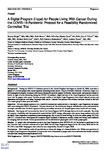A Digital Program (Hope) for People Living With Cancer During the COVID-19 Pandemic: Protocol for a Feasibility Randomized Controlled Trial
| dc.contributor.author | Wright, H | |
| dc.contributor.author | Martin, F | |
| dc.contributor.author | Clyne, W | |
| dc.contributor.author | Clark, CCT | |
| dc.contributor.author | McGillion, M | |
| dc.contributor.author | Matouskova, G | |
| dc.contributor.author | Turner, A | |
| dc.date.accessioned | 2021-10-04T10:59:04Z | |
| dc.date.issued | 2020-12-04 | |
| dc.identifier.issn | 1929-0748 | |
| dc.identifier.issn | 1929-0748 | |
| dc.identifier.other | e24264 | |
| dc.identifier.uri | http://hdl.handle.net/10026.1/17982 | |
| dc.description.abstract |
<jats:sec> <jats:title>Background</jats:title> <jats:p>During the COVID-19 lockdown period in the United Kingdom that began on March 23, 2020, more than a quarter of a million people with cancer reported worsening mental health. Help to Overcome Problems Effectively (Hope) is a self-management program for people with cancer, designed to provide support for distress, unmet needs, and poor psychological health. In light of social distancing during the COVID-19 pandemic, digital delivery of the Hope Programme has become ever more vital for people with cancer. Previous pre-post studies of the digital Hope Programme have found reduced anxiety and depression and improved well-being for people with cancer. However, evaluation of this evidence has been limited by the lack of a control group in these previous studies.</jats:p> </jats:sec> <jats:sec> <jats:title>Objective</jats:title> <jats:p>We now present a protocol for a feasibility randomized controlled trial of the digital Hope Programme for people with cancer during the COVID-19 pandemic. Primary outcomes will be recruitment, dropout, and adherence rates, and estimations of sample and effect size. To detect signals of efficacy, secondary outcomes will be participant mental health and well-being.</jats:p> </jats:sec> <jats:sec> <jats:title>Methods</jats:title> <jats:p>Participants will be recruited by Macmillan Cancer Support (MCS) through their social media networks. The study will employ a feasibility wait-list randomized controlled trial (RCT) design, with people with cancer being randomized to join the digital Hope Programme immediately (intervention group [IG]) or join a 6-week waiting list (wait-list control group [WLCG]) with a 1:1 allocation ratio. Participants will complete digital measures of depression, anxiety, mental well-being, and confidence in managing their own health. Online questionnaires will be administered preprogram and 6 weeks postprogram.</jats:p> </jats:sec> <jats:sec> <jats:title>Results</jats:title> <jats:p>All people who had requested access to the Hope Programme from MCS (N=61) will be invited to participate in the trial. Baseline data collection commenced in April 2020, and the Hope Programme began for the IG in May 2020 and for the WLCG in June 2020. Postprogram data collection was completed by the end of August 2020.</jats:p> </jats:sec> <jats:sec> <jats:title>Conclusions</jats:title> <jats:p>This feasibility study will provide data to inform the design of a future definitive trial. Wider-scale provision of the digital Hope Programme has potential to improve the lives of thousands of people with cancer and reduce the burden on health care providers during these unprecedented times.</jats:p> </jats:sec> <jats:sec> <jats:title>Trial Registration</jats:title> <jats:p>ISRCTN Registry ISRCTN79623250; http://www.isrctn.com/ISRCTN79623250</jats:p> </jats:sec> <jats:sec> <jats:title>International Registered Report Identifier (IRRID)</jats:title> <jats:p>DERR1-10.2196/24264</jats:p> </jats:sec> | |
| dc.format.extent | e24264-e24264 | |
| dc.format.medium | Electronic | |
| dc.language | en | |
| dc.language.iso | en | |
| dc.publisher | JMIR Publications | |
| dc.subject | self-management | |
| dc.subject | survivorship | |
| dc.subject | cancer | |
| dc.subject | feasibility | |
| dc.subject | randomized controlled trial | |
| dc.subject | COVID-19 | |
| dc.subject | protocol | |
| dc.subject | digital health | |
| dc.subject | intervention | |
| dc.title | A Digital Program (Hope) for People Living With Cancer During the COVID-19 Pandemic: Protocol for a Feasibility Randomized Controlled Trial | |
| dc.type | journal-article | |
| dc.type | Article | |
| plymouth.author-url | https://www.ncbi.nlm.nih.gov/pubmed/33237877 | |
| plymouth.issue | 12 | |
| plymouth.volume | 9 | |
| plymouth.publication-status | Published online | |
| plymouth.journal | JMIR Research Protocols | |
| dc.identifier.doi | 10.2196/24264 | |
| plymouth.organisational-group | /Plymouth | |
| plymouth.organisational-group | /Plymouth/Faculty of Health | |
| plymouth.organisational-group | /Plymouth/Faculty of Health/Peninsula Medical School | |
| plymouth.organisational-group | /Plymouth/REF 2021 Researchers by UoA | |
| plymouth.organisational-group | /Plymouth/REF 2021 Researchers by UoA/UoA03 Allied Health Professions, Dentistry, Nursing and Pharmacy | |
| plymouth.organisational-group | /Plymouth/Users by role | |
| plymouth.organisational-group | /Plymouth/Users by role/Academics | |
| dc.publisher.place | Canada | |
| dcterms.dateAccepted | 2020-10-20 | |
| dc.rights.embargodate | 2021-10-5 | |
| dc.identifier.eissn | 1929-0748 | |
| dc.rights.embargoperiod | Not known | |
| rioxxterms.versionofrecord | 10.2196/24264 | |
| rioxxterms.licenseref.uri | http://www.rioxx.net/licenses/all-rights-reserved | |
| rioxxterms.licenseref.startdate | 2020-12-04 | |
| rioxxterms.type | Journal Article/Review |


